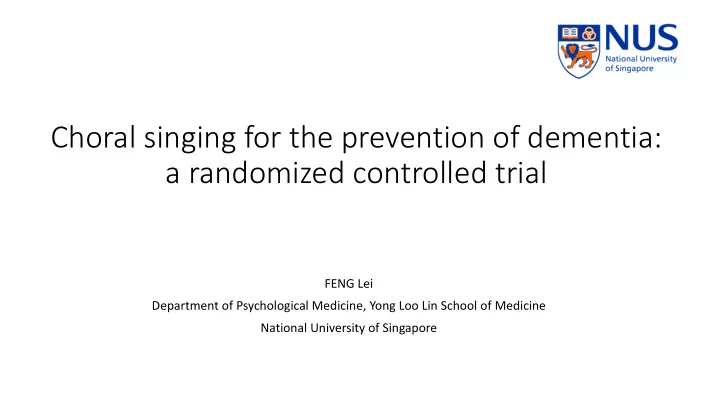

Choral singing for the prevention of dementia: a randomized controlled trial FENG Lei Department of Psychological Medicine, Yong Loo Lin School of Medicine National University of Singapore
Cognitive function decline with increasing age. Yu J, Yu J, Feng Q, Zeng L, Feng L. Late-life cognitive trajectories and their associated lifestyle factors 2017 (manuscript under review)
Alz Alzheim heimer er’s “pa patho tholo logy” Normal AD Gross Pathology Cellular Pathology Amyloid plaques: Neurofibrillary tangles: v Aggregated amyloid-β v Hyperphosphorylated peptide (Aβ) Tau protein
THE RACE AGAINST ALZHEIMER? Source: Miia Kivipelto ICAD 2010
My research focues on: Diet, nutrition, behaviors, lifestyles, cultural activities. Promote healthy aging, prevent dementia, understand the biology.
Choral Singing for the Prevention of Dementia: A Randomized Controlled Trial
Ai Aims • To evaluate the efficacy of choral singing in the prevention of dementia • To examine the underlying mechanisms using Magnetic Resonance Imaging (MRI) technique and a panel of peripheral biomarkers in venous blood and urine
Study Design • Randomized, controlled trial • N=360 (93 recruited) • Choral Singing vs. Health Education • Intervention duration: 2 years
Interventions Focuses on joy of choral singing and providing a full musical, Active control arm: target at lifestyles and vascular health, physical and social experience for participants involve social interactions and learning new skills
Inclusion and Exclusion Criteria Inclusion criteria: • Community-living elderly aged 60 years and above, and • Subjective cognitive complaints based on self-report, or High risk of • Objective cognitive impairment based on neuropsychological test scores, or dementia • Multiple risk factors of dementia such as family history, depression, etc., and • Not demented: Clinical Dementia Rating (CDR) global score=0 Exclusion criteria: • Any terminal illness, OR • Aphasia, OR • Marked hearing impairment, OR • Participating in another interventional study.
Outcome Measures Primary outcome measure: Composite cognitive score from a standard neuropsychological test battery: Rey Auditory Verbal Learning Test (RAVLT), Digit Span, Color Trails Test 1&2, Block Design, Symbol Digit Modality Test (SDMT), and Boston Naming Test. Secondary outcome measures: 1. Brain magnetic resonance imaging (MRI). 2. Blood and urine based biological markers 3. Mini-Mental State Examination (MMSE) 4. Montreal Cognitive Assessment (MoCA) 5. Depressive symptoms 6. Anxiety symptoms 7. Neuropsychiatric symptoms 8. Perceived stress 9. Sleep quality
Biological effects (HYPOTHESIZED) • Changes in the brain (MRI) • Changes in biological markers - Slowed age-related atrophy - Reduced oxidative damage - Better connectivity - Reduced inflammation - Better functional activation - Increased immunity - epigenetic changes
MRI Protocol, John Suckling Sequence Purpose Time (min) 1 Localizer Position imaging slice 0:14 2 3D MPRAGE High-resolution anatomy 5:01 3 BOLD_Resting Detect functional connectivity under resting state 9:01 4 BOLD_FNPA brain activations under FNPA task 7:36 5 BOLD_SIN Brain activations under singing task 2:36 6 BOLD_auditory localizer Location of auditory cortex 3:06 7 Gre field map for distortion correction 1:07 8 Ep2d_diff (DTI) White matter integrity 9:06 9 T2_SWI Detect micro-bleeds 4:54 10 T2_TSE_ FLAIR Detect and characterize structural lesions 4:28 11 BOLD_TUNE Brain activations under the TUNE task 3:06 12 ASL (optional) Cerebral blood flow 8:38 TOTAL
Age-related biomarkers Anis Larbi Irwin Cheah, Barry Halliwell • Classical markers of senescence (CD57, • Markers of oxidative damage (F 2 - isoprostanes; F 4 -neuroprostanes; 8-hydroxy- KLRG1) and exhaustion (PD1) of T cells. 2’-deoxyguanosine; allantoin and urate • Identification of subpopulations of B cells concentrations; hydroxyeicosatetraenoic and myeloid cells with a focus on pro- acids) in the plasma and urine. inflammatory cells. • Protein carbonyl contents in the plasma. • Functional capacity: proliferation profile and pro-inflammatory cytokines. Plan: Epigenetics @Roger FOO
Geriatric Depression Scale Geriatric Anxiety Inventory 3 3 2 2 Score Score 1 1 Choral group HEP group Choral group HEP group 0 0 Baseline 6-month Baseline 6-month
Acknowledgements • NUS Virtual Institute for the Study of Ageing (VISA), Singapore • National Medical Research Council, Singapore • National lnnovation Challenge on Active and Confident Ageing Programme, MOH, Singapore • NUS Society Choir Research Fund, Singapore • Alice Lim Memorial Fund, Singapore • Training and Research Academy at Jurong Point (TaRA@JP), Singapore • Kwan Im Thong Hood Cho Temple, Singapore • Health Promotion Board (HPB), Singapore • Anonymous private donors, volunteers and all research study participants • Forte – Swedish Research Council for Health, Working Life and Welfare • Investigators, study musicians, study participants.
The FENG research lab, current members: Senior executive: Elisabeth Ow Research Assistants: Christabel See, Tan Yue Qian, Angela Au Research Nurses: Low Yin Fong, Linda Boon Lee Chin, Bernard Lee, Elaine Phang, Eileen Sin, Chua Sok Hwee. https://www.researchgate.net/profile/Lei_Feng6
Recommend
More recommend